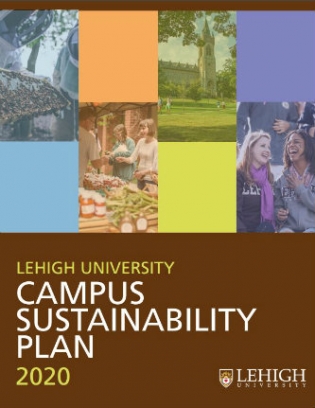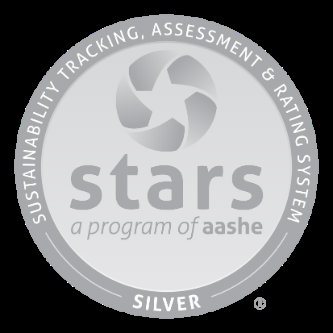Lehigh Unveils Sustainability Plan 2020

In order to continue on an upward trend in sustainability achievements, Lehigh has updated its 2012 sustainability plan to the Campus Sustainability Plan 2020.
Lehigh’s Sustainability Plan is an interdisciplinary and interdepartmental effort that establishes a long-term vision for sustainability with meaningful short- and intermediate-term goals. The plan will build upon past accomplishments and continue to support the university’s goal of integrating sustainability into the administrative, academic and operational processes.
The Campus Sustainability Plan 2020 emphasizes the need for Lehigh to incorporate sustainable principles in its core mission and business practices. The university is committed to the integration of sustainability principles in its cultural fabric, including the capital investments, policies, programs and resources.
“The plan aligns with our capital plans and strategic plan by enhancing the educational experience, facilities and infrastructure, and business practices,” says President John Simon. “It will create smarter, more adaptable, flexible spaces that enhance teaching and learning.”
The plan breaks campus efforts down into four distinct focus areas: academics & educational experience, campus & community engagement, operations, and planning & administration. While the four areas are specifically established, the university’s primary goal is to ensure cross-collaboration among all campus groups that will lead to success in sustainability efforts.
According to the new plan, Lehigh will specifically aim to increase student learning of sustainability through academic programming. The idea is essentially that faculty, staff and students utilize the campus as a living laboratory to identify opportunities and apply innovative approaches that reach ambitious goals.
“Higher education is poised to make significant contributions to creating a more robust, resilient, and verdant future,” says Lehigh Sustainability Officer Delicia Nahman. “At our core, we have always positioned our students to meet the challenges of the future; we are an institution rooted in research and problem-solving.”
The first step includes establishing sustainability as a learning outcome when graduating from degree-earning programs by offering incentives for faculty in multiple disciplines or departments to develop new sustainability courses and/or incorporate sustainability into existing courses and departments.
“Our position as an anchor institution in the Lehigh Valley as well as our national and global presence requires us to lead by example,” Simon says. “ It means that the decisions we make today will have long-lasting impacts on the communities in which we live, work, and play. “
To supplement classroom learning, Lehigh plans to extend the peer-to-peer sustainability outreach program to reach 100 percent of undergraduate and graduate students by 2020, and an additional 8 percent of faculty and staff, by adding 10 new offices to the program per year. As part of its campus community engagement efforts, Lehigh envisions positive, meaningful, and reciprocal engagement and aims to embrace diverse perspectives and experiences throughout campus and the surrounding community.
Lehigh also will continue to improve food on campus, setting the goal of having 20 percent of food aligning with one or more of four categories (local, humane, fair trade, organic) by 2020.
Operationally, Lehigh is taking action to increase efficiency, reduce emissions and maximize capital investment, thereby minimizing long term financial and environmental risk and enhancing the overall well-being of the university and community. Following suit in campus designs which enhance sustainability, Lehigh will create an energy management plan that addresses campus growth and building needs, energy efficiency retrofits, behavior change opportunities and future reduction targets that reduce energy use per square foot by 25 percent over the 2007 baseline.
The plan additionally calls for the creation and implementation of a waste management plan to minimize waste generated on campus by 10 percent over the 2010 baseline and an increase in recyclables by 10 percent over the 2012 baseline.
As a result of consistent efforts throughout the years, Lehigh has made significant strides and has been nationally recognized for its achievements in sustainability, and the university will continue to make a name for itself among universities across the globe as it seeks to educate the community on sustainability by leading through example.
Simon adds, “We look forward to fully implementing the plan, and I’m confident that together we can build a more sustainable Lehigh—and positively influence the sustainability of our wider world.”
Lehigh’s sustainability efforts
In 2009, Lehigh signed a Climate Commitment pledging to make environmental issues part of its overall mission. Actions put forth in the document included: completing a comprehensive inventory of campus greenhouse gas emissions and updating the inventory every year thereafter; establishing a policy that all new campus construction would be built at least to the U.S. Green Building Council's LEED (Leadership in Energy and Environmental Design) silver standard or be LEED certified; and making environmental sustainability and climate change part of the curriculum and overall educational experience for all students.
As a result of these efforts, a gold LEED certification was achieved in the design and building of the STEPS building and the renovation of Williams Hall. A number of campus improvements have been implemented including a variety of educational and volunteer opportunities which continue to grow to this day.
Additionally, in 2012, Lehigh adopted its first campus sustainability plan which reflected sustainability commitments by identifying goals in nine areas of focus: food and dining, academics and educational experience, energy and climate, environment and land use, transportation, purchasing, water, waste, and community building and social equity.
“Lehigh University is committed to integrating sustainability throughout the university,” Vice President for Finance and Administration Patricia Johnson said. “Over the past few decades we created policies and programs that integrate concepts of sustainability into the educational experience, operations, workplace and campus culture. These efforts are intended to build a more environmentally and socially minded campus climate and in support of the broader community in which we live.”
In recognition of its sustainability achievements, Lehigh University has received a Sustainability Tracking, Assessment and Rating System (STARS) Silver rating from the Association for the Advancement of Sustainability in Higher Education (AASHE) for the 2016 academic year.
AASHE’s STARS program is the most widely recognized framework in the world for publicly reporting comprehensive information related to a college or university’s sustainability performance, with more than 750 participants in 24 countries across six continents.
Lehigh participates in the program as part of its sustainability effort to determine its standing among other universities and organizations worldwide, to see what is working and where improvements can be made.
Participants report achievements in four overall areas: operations, academics, engagement, and planning, administration and are given a score which translates to a bronze, silver, gold or platinum ranking.
The new plan sets in place a number of actions to take in order to achieve Lehigh’s next goal: to achieve a platinum ranking by 2020.
“STARS was developed by the campus sustainability community to provide high standards for recognizing campus sustainability efforts,” said AASHE Executive Director Meghan Fay Zahniser. “Lehigh University has demonstrated a substantial commitment to sustainability by achieving a STARS Silver Rating and is to be congratulated for its efforts.”
In 2015, Lehigh submitted its first STARS report through AASHE STARS and achieved a bronze score reflecting its sustainability efforts and values. In 2016, Lehigh's efforts to include sustainability in students' curriculum, to create a healthy environment, with an engaged and equitable community, and to minimize waste and natural resources consumption led the university to improve from a bronze ranking (36.7 points), in 2015, to silver (52.9 points), in 2016.
The 16.2 point increase in Lehigh’s score was a direct result of implementation of a number of sustainability efforts across various campus-wide organizational structures.
“Collecting data from across the university and making it widely available has led to recognition of gaps, better informed planning decisions and celebration of our immense progress,” Nahman says. “The Lehigh community should be incredibly proud of our efforts in relation to how far we’ve come and compared to other institutions of higher education”
In the classroom and around campus, Lehigh increased the number of courses that address sustainability by more than 60 percent, increasing from 77 in the 2014-2015 school year to 116 in the 2015-2016 school year.
By promoting sustainability to more than 3,000 students through the Eco-Reps club and more than 100 employees through the Sustainable Office Program, Lehigh was able to increase involvement among students and employees with peer-to-peer sustainability programs. The university also saw more than 2,000 students participating in community service.
Beyond academics and service, efforts to increase “real food” on campus resulted in 10 percent of dining services food and beverage expenditures, and 10 percent of on-site franchise, convenience store, vending services, and concessions food and beverage purchases that are local and community-based.
In recent years, Lehigh has made significant strides in increasing the campus’s sustainability and will continue to do so, with efforts being made across all disciplines, with the Campus Sustainability Plan 2020. The plan in its entirety can be viewed here.
Posted on:






